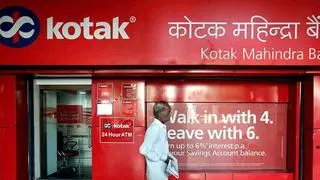Kotak Mahindra Bank expects emergence of more specialised and high-tech companies to bring intelligent and credit-oriented promoters to agriculture technology space for boosting lending to this sector.
The bank sees good traction in terms of cash flow throughput on the e-NAM (National Agricultural Market) platform from less advanced states such as Jharkhand, Odisha and Bihar whose APMC market set-ups are less evolved.
BS Sivakumar, President and Key Leadership Team member, Kotak Mahindra Bank, said the bank is working on getting information and analysing the profile of the participants on e-NAM, and the next stage is to develop credit modules, so that lending can be based on the value of transactions being put in by individuals and corporates.
Also see: How good governance can cement the success of agri cooperatives
Historically, he said, the bank had developed a focused agriculture team to cut through the complexities of such a project and evaluate agri-tech space for lending.
Agri entrepreneurs
Last year, the government had established an Agriculture Infrastructure Fund under which banks are required to support agriculture entrepreneurs. Among private banks, Kotak is among the largest in terms of sanctions given for the agriculture infrastructure fund, and recently went live on the e-NAM platform.
Glitches
The biggest challenge in rural banking is that people do not believe in keeping big balance in their bank accounts and prefer to keep liquid money, said Sivakumar.
Having said that, the rural segment has been shifting to the digital mode of payment due to its convenience and online collections for the bank has shown a positive trend, he said.
Kotak Bank has an agriculture loan book of about ₹30,000 crore with focus on small and marginal farmers, traders, dealers, SME cold storage companies, warehouses and processors, large agriculture corporate segment, lending to NBFCs for micro-loans, tractor finance, vehicle financing, and microfinance segment.
Beyond traditional farming
Farmers are showing interest in advanced activities and the bank is focussing on lending for value-added cultivation such as horticulture, dairy, mushroom cultivation, floriculture, fruit plantations, poultry and fisheries, besides working capital for large corporates.
Also see: Kotak Mahindra Prime buys Ford’s passenger vehicle loan portfolio
The second wave of Covid had impacted collection in the rural market but on a comparative basis, the rural segment was still not as badly affected as the urban segment, he said.
“Collections in the microfinance vertical were affected because agents from banks could not go out due to travel restrictions. Later, the government announced a six-month moratorium. So largely, we have not seen any major defaults in our books. There has been some impact but we expect a recovery in the next six months,” said Sivakumar.








Comments
Comments have to be in English, and in full sentences. They cannot be abusive or personal. Please abide by our community guidelines for posting your comments.
We have migrated to a new commenting platform. If you are already a registered user of TheHindu Businessline and logged in, you may continue to engage with our articles. If you do not have an account please register and login to post comments. Users can access their older comments by logging into their accounts on Vuukle.